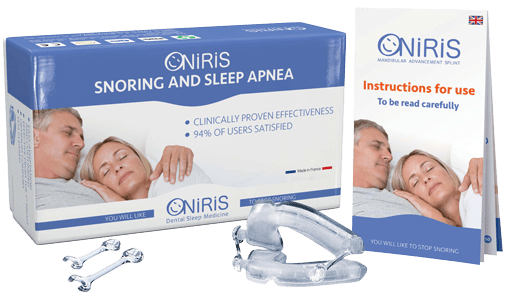Home / Sleep apnoea / Treatments
Which treatment to choose for sleep apnoea?
Sleep apnoea is a particularly disabling condition for sleepers. In addition, sleep apnoea can be difficult to treat: treatments for sleep apnoea depend on the severity of the apnoea. There are various solutions to treat sleep apnoea. Which sleep apnoea device to choose? How to get these treatments? We will tell you everything and explain how you can find the most suitable solution for your situation.
What are the risks of untreated sleep apnoea?
Sleep apnoea syndrome is one of the most common sleep disorders. A sleep apnoea is a respiratory arrest of at least 10 seconds occurring several times during the night. These breathing pauses result from the relaxation of the pharyngeal muscles which obstruct the trachea. The symptoms of sleep apnoea are numerous: chronic fatigue during the day, lack of concentration, frequent and sudden falling asleep, irritability during the day, etc. As you can see, sleep apnoea considerably alters the quality of life of those affected. Difficult to diagnose, sleep apnoea exposes sleepers to various inconveniences, including an increased risk of chronic diseases. Many patients with sleep apnoea have high blood pressure, are prone to depression and develop diabetes over time. The most common illnesses among people with sleep apnoea are:
- High Blood Pressure
- Type 2 diabetes
- Cardiovascular accidents
- Depression
- A metabolic syndrome
That’s not all: sleeping without ever getting a restful night’s sleep leads to great fatigue, and therefore to a lack of vigilance on a daily basis. This often results in accidents in everyday life, accidents at work or simply road accidents. As you will have understood, the risks associated with sleep apnoea are numerous, so it is best to treat this disorder as soon as it appears.
How to treat sleep apnoea: which device to choose?
There are different treatments for sleep apnoea. It is essential to determine the most suitable treatment for you recommended by a health professional. The latter will take into consideration the severity of the apnoea to direct their patient towards an effective treatment.
Central or obstructive sleep apnoea: the right treatment
There are two types of sleep apnoea: central and obstructive sleep apnoea. Each type of apnoea has its own treatment: these disorders have different characteristics and should not be treated in the same way.
For obstructive sleep apnoea the following are generally recommended, a mandibular advancement device, an anti-snoring device able to clear the airways, or a CPAP treatment (Continuous Positive Airway Pressure). This device is in the form of a box connected to the patient by tubes and a mask (nasal, oral or both). CPAP administers air to the airways to limit soft tissue collapse.
Central apnoea is generally treated with self-controlled ventilation, a breathing aid delivered via a circuit and a mask. The assistance level adjusts automatically to stabilise the patient’s breathing.
Treatment for severe, moderate or mild sleep apnoea
As mentioned above, it is important to treat sleep apnoea according to its degree of severity. Mild to moderate sleep apnoea can be treated with a customised mandibular advancement device, less restrictive than a CPAP treatment because it is better tolerated. This type of anti-snoring device is renowned for its effectiveness, making it one of the most prescribed sleep apnoea treatments.
CPAP treatment is prescribed more for severe sleep apnoea. Finally, as a last resort, surgery is sometimes necessary. This type of treatment is reserved for special cases, such as anomalies of the maxillofacial sphere or anatomical anomalies of the ENT field.
Say goodbye to snoring!
Oniris® oral device
- Unique comfort to sleep peacefully
- Unmatched clinical effectiveness
- Secure online payment
Ordering treatment for sleep apnoea
Do you think you suffer from sleep apnoea? The first step is to consult your doctor in order to direct you towards the most suitable sleep apnoea treatment. At the end of your consultation, the doctor may prescribe sleep tests to be carried out in a sleep laboratory (polysomnography) or on an outpatient basis (respiratory polygraphy). These examinations will enable you to detect the presence of sleep apnoea, but also to assess its level of severity.
Would you like to order an oral device? This type of device has a variable lifetime and cost depending on the model. The Oniris oral device has an average lifespan of 12-24 months and costs £99 depending on the number of oral devices ordered. You can order your Oniris mandibular advancement device online.
